
I don't know how to explain it, other than, perhaps, Libra perversity, but growing up I would either have two friends who hated each other, or two friends who liked each other but my parents disapproved of one or both. So for years I embarked on a fruitless and depressing campaign to make everybody I like like everybody else I like, or at least to make the people I like dislike the people I dislike. For my efforts, all I can say is that people seem to like me less and it serves me right. So instead, I've tried to make the people I like to like the same things that I like. After all, could I ever really love and respect somebody who isn't a Beatles fan? I don't know, I just don't know--sorry Mom.
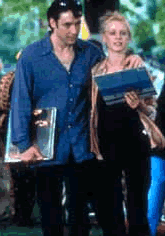
High Fidelity: Rob& Laura
In High Fidelity, the third best movie I saw this year, John Cusack's character Rob expressed the importance of discerning a potential hook-up's cultural preferences because while humans' natures seem to change between nightfall and breakfast, their tastes do not. Think about it-you don't want to be with a big Oliver Stone (or insert your own personal antichrist here) fan for or in twenty years; but a Who fan? There's a keeper, someone you can relate to forever. Likewise, the pallid cipher and the corpulent blowhard who started working part time for Rob and ended up spending all day every day in his shop arguing about music and making variously themed lists of pop songs are connected by nothing but their militant passion for music that explains and justifies everything else in their lives. They might not agree with each other, but they sure as hell aren't going to sell a rare album to an unworthy supplicant. They pay an exacting price for their exacting standards, sabotaging relationships with rampant snobbery and nitpicking:

High Fidelity: The corpulent blowhard, the pallid cipher, Rob, and a compatible hook-up
Rob: Liking both Marvin Gaye and Art Garfunkel is like supporting both the Israelies and the Palestinians.
Laura (his perfect match, if he'd let her be): No, it's really not, Rob. You know why? Because Marvin Gaye and Art Garfunkel make pop records.
Rob: Made! Made! Marvin Gaye was shot by his father!
That's why, according to HF, making a mix tape for somebody (like my glamorous brother Pat and the estimable Aureng Zebe recently did for me) denotes a high degree of personal investment and regard. A mix tape should not pander to the recipient's prejudices, though they should be a consideration, because the whole point is to introduce somebody to something new, or illume something familial in an unfamiliar context. It should lure a person away from their preconceptions; and let me
me tell you, it takes faith to listen to Bell & Sebastian or The Passengers until finally you feel a switch flip in your brain and you say, "Oh…," or to listen to Magi's The Harder They Come soundtrack thinking you hate reggae and learning you only hate Bob Marley. Or, if you are Rob, learning to tolerate-if not appreciate-different songs and underwear that isn't lingerie because they are not his, but hers.
American Psycho, the second best movie I saw this year, is a worst case scenario of what would have happened to the guys in High Fidelity had they failed to get over themselves. If you look past the conspicuous trappings of wealth, and it's no easy task, the nightmare yuppettes collecting Armani suits, women, and dinner reservations at the most exclusive restaurants are not that different from Rob and his music bullies with their record collections arranged just so. They are all rotted through with vanity, but whereas the guys in HF have retained, and are redeemed by, an almost adolescent awe of women and art, those in AP are too rich to value anything that can be bought, too jaded to see worth in the parade of secretaries, doped up debutants and prostitutes that are their only female contact, and so alienated from normal human contact that one of them mistakes attempted murder with a homoerotic caress. They are also practically indistinguishable even amongst themselves-no wonder an inferior business card can trigger an identity crisis. Patrick Bateman, however, is different, special in his own mind, because while his peers in mergers and acquisitions make puns about being in "murders and executions," he really means it.
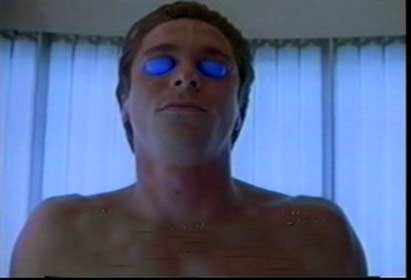 American Psycho: Fake Tan, Fake Everything
American Psycho: Fake Tan, Fake Everything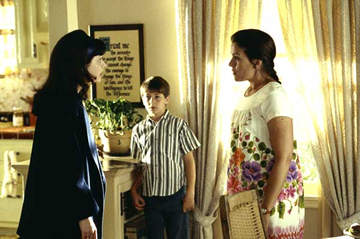
Almost Famous: "This is a house of lies!"
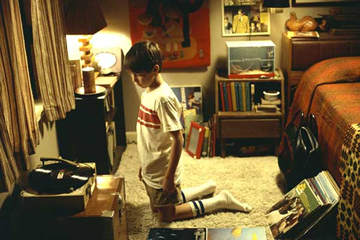 Almost Famous: "If you listen to Tommy with a candle burning you will see your entire future."
Almost Famous: "If you listen to Tommy with a candle burning you will see your entire future."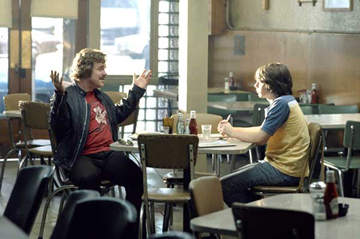 Almost Famous: The Uncool
Almost Famous: The Uncool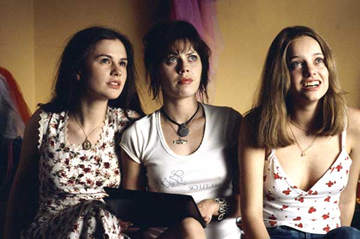 Almost Famous: Yours for a Case of Heineken
Almost Famous: Yours for a Case of Heineken Almost Famous: Stillwater, "Just make us look cool."
Almost Famous: Stillwater, "Just make us look cool."The movie that embraces both the worship of music and the occasional inhumanity of its devotees and practitioners, is the best movie I've seen so far this year-Almost Famous.
Cameron Crow, who wrote and directed Almost Famous, as well as Say Anything…, Singles, and Jerry McGuire, understands about music. Even if you didn't know that he started touring with rock bands and writing for Rolling Stone as a whilst in his early teens, you could tell from that moment in Say Anything… where John Cusack turns up a song on the radio and tells his date, "I have this album." He's trying to impress the most impressive girl in his school, and you might not think this is the way to go about it as she gives a demure, "Hmmm," but for music lovers of a certain order, it's a compulsion. And if you share that compulsion, you will have an appreciation for the parting gift Anita Miller leaves her brother William-all of her record albums. A handwritten note on one of them says, "If you listen to Tommy with a candle burning you will see your entire future." Almost Famous, better than any movie since Quadrophenia and before that A Hard Day's Night, celebrates the transportative power of music.
And not just cliquey Rolling Stone/ Lester Bangs approved pop. In fact the movie starts with, of all things, a Christmas carol sung by Alvin and the Chipmunks, and goes on to include selections by David Bowie (covering The Velvet Underground), Simon and Garfunkle, Rod Steward, The Who, The Seeds, The Beach Boys, Lynyrd Skynyrd, Yes, and on and on. The movie is a Cameron Crowe mix tape. Already irresistible songs are impeccably placed and give both movie and music resonance. For instance, sixteen year old Penny Lane thinks of herself and her gang as muses-Band Aids, not a pack of sleazy groupies. They follow the movie's fictional band Stillwater because they genuinely love their music and feel they have a contribution to make to it. After a concert, Penny dances amid the trash on an arena floor like it is a field of starlit poppies while the Cat Stevens song "The Wind" plays. "I let my music take me where my heart wants to go," it says, aptly summing up the Band Aid philosophy, and continues, "I swam upon the devil's lake, but…I'll never make the same mistake" to foreshadow how misplaced her trust and optimism will prove to be. Even more astonishing is how Crowe manages to invoke fan-feeling for tunes I've never particularly liked; e.g. Elton John's trite life-on-the-road-wah ballad "Tiny Dancer," which when sung by the characters after a nasty blow-up becomes an anthem-a statement of common commitment to music to the music that propels them, and a moving song in it's own right.
In fact, a major theme of Almost Famous is the power of music to move a person, not only emotionally but physically. Stillwater is not only on tour, they are at a transitional point in their career represented by their switch from tour bus to private jet. The Band Aids follow them because they love music and their access to its creators, but they allow themselves to become as commodified as the latest hit single and traded to the roadies of another band for a case of Heineken. Anita finds fuel for rebellion and escape from her mother in her record albums ("This song [Simon and Garfunkel's 'America'] explains why I am leaving home to become a stewardess"), and passes them on to her brother (who belatedly learns that puberty is even farther off than he had been led to believe) for the same purpose. William meets his mentor Lester Bangs when Bangs visits Southern California on a radio tour, and William is assigned to follow the band and write them up for Rolling Stone Magazine.
Above all, the passion music inspires is not cool, maybe not even for its creators. Presentation is everything, and its jealous regard is what separates vainglorious Stillwater (and vain, murderous Patrick Bateman, for that matter) from the guys in the record store in High Fidelity and the reporters and groupies in Almost Famous, and from some of us. Ultimately though, that's not a bad thing. All three of these movies show that the further the characters get from cool, the closer they are to joy, enthusiasm, generosity, and sincerity. Or as Lester Bangs (in reality, one of rock's foremost critics and an intimate of Crowe's) says in Almost Famous, "The only true currency in this bankrupt world is what you share with someone else when you're uncool."
So this winter, please try to find Almost Famous in the theaters before it leaves, wrap up, and stay uncool.
(Written by Sharon C. McGovern)
From Vol. 25
Back to Cobra Movies
PS. Of course I love and respect my mother.

Almost Famous: Penny Lane